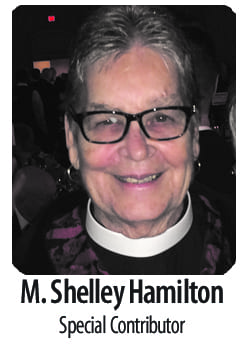Defending and reclaiming a word once used as a weapon of hate

We’re here! We’re queer! Get used to it! If you walk down Cedar Springs in Dallas on gay Pride parade day — or on Pride parade day in almost every other city in America — you’ll hear this chant of defiance and celebration.
 I love being queer. I love queers, even those I don’t particularly like. When I use the word “queer,” I speak of gender-bending, same-gender-loving, transgender, nonconforming, bi people. I prefer it to the acronym we persist in using to identify ourselves, and those who are in solidarity with us.
I love being queer. I love queers, even those I don’t particularly like. When I use the word “queer,” I speak of gender-bending, same-gender-loving, transgender, nonconforming, bi people. I prefer it to the acronym we persist in using to identify ourselves, and those who are in solidarity with us.
Regardless of how we identify ourselves, in the eyes of society, we are all queer. Sometimes, even within our communities, we still categorize ourselves, much as our non-queer counterparts do, thereby internalizing their prejudices into our lives and communities.
I know the word “queer” has been used a very long time as a pejorative term for gays and lesbians. I also know some queers don’t like being identified as queer, believing it’s offensive and derogatory. But for me, “queer” is an inclusive term. The letters, GLBT don’t include many other people who are marginal within society because they, too, are “odd,” “different,” “out of the ordinary.”
No matter their sexuality, they are our people too.
During the early 1980s, our community began to transform the word “queer.” We embraced it as an affirmation of same-gender love. We claimed the word, making it our own, thus disempowering its ability to hurt us.
Also in the ’80s, we were our most radical, most in-your-face selves. We had no choice — a pandemic called AIDS had attacked the men of our community. When our men were attacked, so were our women, who cared for the ill men. A sexually transmitted virus was destroying innumerable lives, along with everything we had fought for since Stonewall. AIDS drove a wedge between people. It further alienated queer people from our families, friends, co-workers, churches, temples, synagogues.
The first time someone called me a queer, I didn’t really understand what they were saying. But I knew one thing instantly: It wasn’t good.
When I consulted a dictionary I discovered “queer” has a daunting history, with many different meanings. It is true — most usages of the word are insulting to “queers,” who, by the way, make up anywhere from 10 to 20 percent of the world’s population, according to recent studies.
And still, many definitions weren’t offensive. Indeed, they resonated with me — words like “odd,” “different,” “unusual” and “out of the ordinary.” I couldn’t grasp why being unusual, eccentric, different made one the brunt of cruel, demeaning jokes.
I rejected my peers’ prejudice and arrogance. Instead, I embraced my new understanding with delight and wonder, and perhaps with a bit of arrogance myself. I felt empowered by the truth growing in my bones, and with childhood certainty I knew, the problem was with “them,” not me.
I did this, of course, without knowing what I was actually doing. I possessed no understanding of sexuality or gender identity. I simply accepted my “out of the ordinariness.” I wasn’t special or better, just beautifully unique — like millions of others.
Certainly, at the time I could not have conceptualized it this way. I instinctively understood that I was dissimilar from my siblings, my parents and most of the kids I knew. Intuitively I also knew queer people don’t choose to be queer. I was born queer and I didn’t choose to have my sexuality become a political, legal or religious topic for discussion on national television or the Internet, or from Sunday pulpits or class room lecterns.
I detest the word “homosexuals.” It identifies us on the basis of our sexuality.
When we speak of non-gay people we don’t refer to them as heterosexuals. Most folks I know don’t appreciate being defined solely on the basis of whom we choose to share an intimate relationship with.
Part of my queerness is being a same-gender-loving woman. I am also ever so much more than my sexuality. I am spiritual and physical. I’m also intellectual and emotional. I am a preacher and a writer. I’m a wife and a grandmother. I’m a vegetarian — definitely queer in Texas!
Like the rest of humanity, queers aren’t homogenous. We are doctors, lawyers, politicians, preachers, dancers, actors, writers, singers, plumbers, mechanics, professors … So much more than our sexuality.
I have an urgent dream that queer people everywhere will choose to identify themselves as an international people known as “queer.” I love the word. I embrace it with delight and freedom. I’ll never apologize for my use of it.
When I look at our world and all its societies and variations of human beings it is the rich, interesting, compelling differences among us that empowers life. When I imagine myself entering our world for the first time, I have no choice but to smile, maybe even laugh. When you get right down to it, who we are, human beings, no matter our origins, are all pretty damn queer.
M. Shelley Hamilton, MDIV, was ordained MCC pastor for many years. She served on staff at the Cathedral of Hope UCC in Dallas in several different capacities for a cumulative 12 years. She retired from professional ministry in December 2014 and now lives with her wife, DebiSu Yelverton, in East Texas, where she is writing her spiritual memoir.
This article appeared in the Dallas Voice print edition April 15, 2016.










